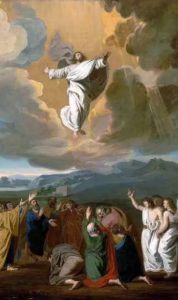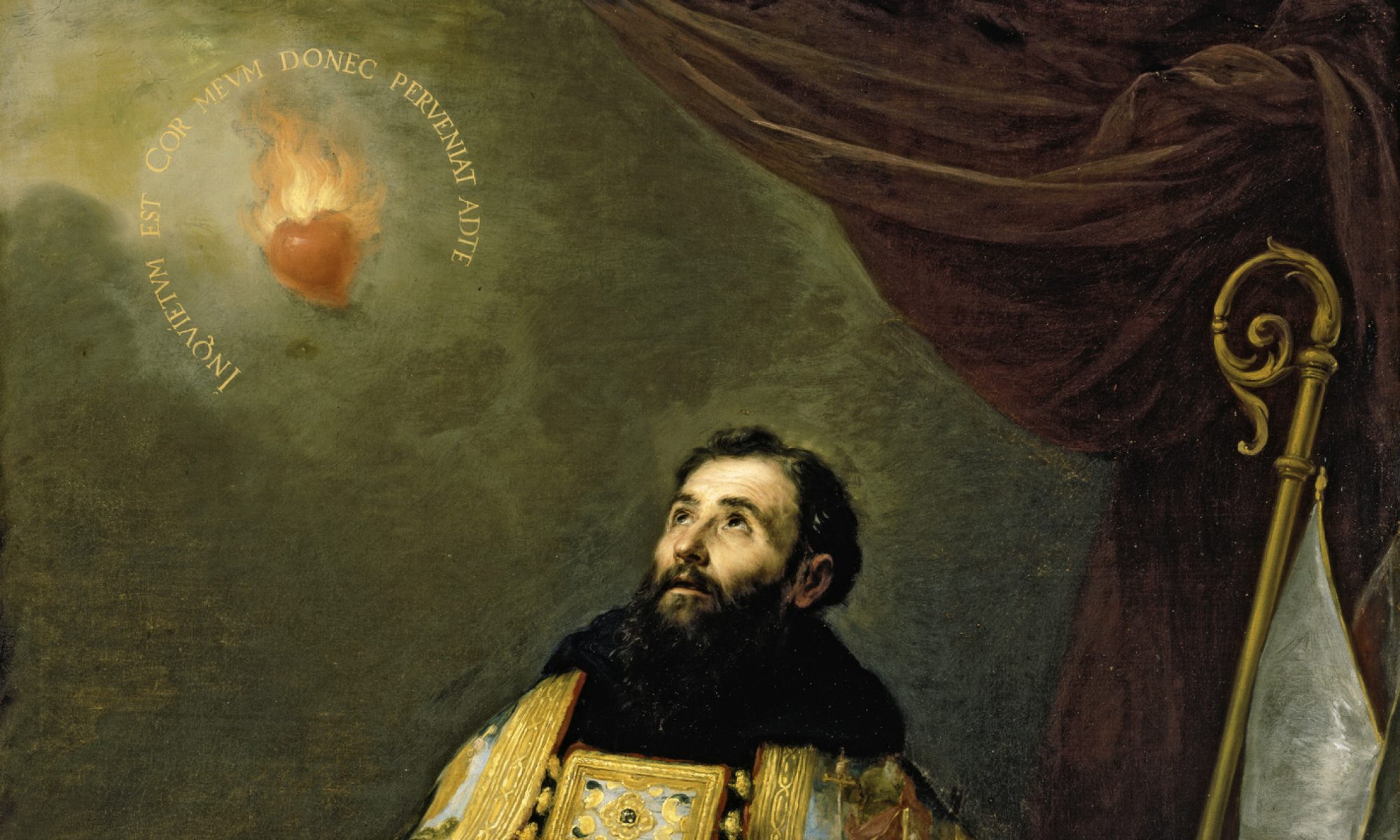In these final days of Easter season, we gather today on the Solemnity of the Ascension of the Lord. We realize that Jesus with his early disciples “led them out as far as Bethany and blessed them He parted from them and was taken up to heaven…returned to Jerusalem with great joy,” and this signaled a new sense of the new reality in their lives wherein Jesus has to go ahead of them.
The readings for today’s feast of the Ascension narrate about the coming of a new reality in the universal Church and the continuation of “Mission” accompanied by the power of the Holy Spirit.
In the first reading from the Acts of the Apostles, His followers were watching as “He was lifted up and a cloud took him from their sight.” His band of disciples watch from the ground as He ascends into heaven. They look forward to the reception of the Holy Spirit and the Spirit’s accompanying power preparing them for a mission in Jerusalem, Judea and Samaria, and “to the ends of the earth.”
In the second reading from the letter to the Ephesians, St. Paul has these striking words, “May the eyes of your hearts be enlightened, that you may know what is the hope that belongs to his call. . . .” St. Paul reveals that there is a different kind of seeing, leading to a deeper kind of knowing. The inner heart has “eyes” that see, a gift of the “Spirit of wisdom and revelation.” These eyes give sure knowledge of the hope that is ours, the hope of sharing in the glory that is our destiny.
The gospel today is taken from the evangelist St. Luke. The synoptic gospels (Matthew, Mark and Luke) tell us about after the Resurrection and the various appearances of Jesus before He was taken up into the heavens, but there was no hint of when it happened; we had no information. However, the Acts of the Apostles concretely mentions that these appearances occurred over a period of 40 days – which is why the Church has chosen to celebrate the Ascension when we do, exactly 40 days after Easter. We need to remember that Jesus’ glorified body wasn’t constrained by the usual limits of time and space.
I invite you to reflect on these expected clues to teach us about the importance of the mystery of the Ascension of the Lord and which are implicitly implied in the readings assigned to the liturgy today.
First, from Acts, it narrates something of what the followers of Jesus experienced when, after forty days of being with them in his resurrected body, he told them to remain close to Jerusalem where God would baptize them in his Holy Spirit. They are to wait, one presumes in anticipation for God’s Spirit to “drown” them in a way – to be poured out in such a way that those who received the Spirit would be born again into a new creation.
Second, it seems that to some, the Ascension event doesn’t make much sense – and therefore doesn’t have much meaning; but unless we try to put ourselves into the situation of Jesus’ closest friends, His Apostles, when they suffered for the loss of Him through a humiliating death on the Cross. Then Jesus returned to them in a “glorified state,” His resurrection, which gives them great hope and rejoicing. Our Responsorial Psalm 47 points us in the right direction: “God mounts His throne to shouts of joy”.
Third, because of the Resurrection of Jesus which led to His Ascension, the world has changed. Everything has been renewed with an ever-living presence of God, so glorious and so real that whatever sense of God, our true identity, friendships and relationships become an encounter of that mystery which gives meaning and fulfillment to our existence. St. Augustine has this for us to ponder on, “If you wander off from the center to any other part, you lose sight of the whole.” (On Order 1,2,3)
Fourth, we become aware of our responsibility to commit to the mission given to us by Jesus. Jesus gave this counsel through these words of St. John Paul II, “You must be strong with the strength that comes from faith. You must be faithful. You must be strong with the strength of hope, the hope that brings perfect joy in life and which prevents us from ever grieving the Holy Spirit. You must be strong with love, the love which is stronger than death ….” Our task to face many challenges of this world is to engage in dialogue, create bridges for unity and understanding, which is a piece of advice from His Holiness Pope Leo XIV.
This is what the Feast of the Ascension of our Lord means. It does not mean that Jesus has left us behind, nor that He has departed from us to some far away place, far from people and from our world. Today’s Feast of the Ascension thus invites us to devote ourselves to consolidating our Lord’s Kingdom on earth, a Kingdom of goodness, justice, solidarity and mercy. It challenges us to give courageous witness to the Gospel before today’s world by bringing hope to the poor, the suffering, the lost and abandoned. It inspires us to be good to those we live and work with, to love them, and by doing so, to show our love for God, who in all things loves us. The Holy Spirit strengthens us, and He is with us because Jesus says, “Behold I am with you always.”
God bless you.
Fr. Arlon, osa
————————-
El Dictado del Corazón: La Ascensión del Señor, Año C
- Lecturas: Hechos 1,1-11
- Salmo 46(47),2-3.6-9
- Efesios 1,17-23
- Lucas 24,46-53
En estos últimos días del tiempo de Pascua, nos reunimos hoy para celebrar la Solemnidad de la Ascensión del Señor. Al igual que los primeros discípulos, también nosotros somos invitados a entrar en una nueva conciencia: darnos cuenta de que, aunque Jesús ya no está físicamente con nosotros, ha ido delante para prepararnos el camino. Como nos dice el Evangelio, Jesús “los llevó hasta cerca de Betania y, levantando las manos, los bendijo. Y mientras los bendecía, se separó de ellos y fue llevado al cielo… regresaron a Jerusalén con gran alegría”. Esto señala una nueva realidad en sus vidas: Jesús tenía que ir por delante de ellos.
Las lecturas de esta fiesta de la Ascensión nos hablan del comienzo de una nueva etapa en la Iglesia universal: la continuación de la misión, ahora acompañada por el poder del Espíritu Santo.
En la primera lectura del libro de los Hechos de los Apóstoles, los discípulos presencian cómo Jesús “fue elevado y una nube lo ocultó de su vista”. Ellos lo contemplan desde la tierra mientras asciende al cielo. Pero pronto su atención se dirige a la promesa que viene: recibirán al Espíritu Santo y su poder, que los preparará para una misión que empezará en Jerusalén, pasará por Judea y Samaria, y llegará “hasta los confines de la tierra”.
En la segunda lectura, de la carta a los Efesios, san Pablo escribe estas palabras tan profundas: “Que los ojos de su corazón sean iluminados, para que comprendan cuál es la esperanza a la que han sido llamados…”. San Pablo nos revela que existe una forma distinta de ver, que conduce a un conocimiento más profundo. El corazón interior tiene “ojos” que ven, gracias al don del “Espíritu de sabiduría y revelación”. Esos ojos dan certeza de la esperanza que nos pertenece: la esperanza de compartir la gloria que es nuestro destino.
El Evangelio de hoy, según san Lucas, nos recuerda una verdad compartida por los evangelios sinópticos (Mateo, Marcos y Lucas): que después de la Resurrección, Jesús se apareció varias veces a los discípulos, pero no permaneció con ellos para siempre. Aunque los evangelios no especifican cuándo ocurrió la Ascensión, el libro de los Hechos nos dice que estas apariciones sucedieron durante cuarenta días, razón por la cual la Iglesia celebra esta solemnidad cuarenta días después de Pascua. Es importante recordar que el cuerpo glorificado de Jesús ya no estaba limitado por el tiempo y el espacio como lo estamos nosotros.
Les invito ahora a reflexionar sobre algunas señales que nos ayudan a comprender mejor la importancia del misterio de la Ascensión del Señor, y que están implícitamente contenidas en las lecturas de hoy.
Primero; El libro de los Hechos narra cómo, después de pasar cuarenta días con ellos en su cuerpo resucitado, Jesús les pide que permanezcan en Jerusalén, donde Dios los bautizará con su Espíritu Santo. Deben esperar, no con pasividad, sino con expectativa confiada. El Espíritu no vendrá solo a consolarlos, sino a transformarlos: a “inundarlos” con poder divino, para que quienes lo reciban nazcan de nuevo como una nueva creación.
Segundo; A algunos, la Ascensión puede parecer un acontecimiento difícil de entender y, por tanto, sin mucho significado. Pero debemos colocarnos en el lugar de los amigos más cercanos de Jesús: sus apóstoles, que habían sufrido la pérdida de su Maestro a través de una muerte humillante en la cruz. Luego, lo vieron resucitado, glorificado, lo cual les dio gran esperanza y alegría. El Salmo responsorial 46(47) nos guía en esta reflexión:
“Dios asciende entre aclamaciones, el Señor al son de trompetas.”
La Ascensión no es abandono; es victoria. Jesús asciende, no para dejarnos, sino para reinar en gloria y enviar al Espíritu Santo.
Tercero; Gracias a la Resurrección y Ascensión de Jesús, el mundo ha cambiado. Todo ha sido renovado por la presencia viva y gloriosa de Dios. Nuestra experiencia de Dios, de nuestra identidad, de nuestras amistades y relaciones, se convierte en un encuentro con el misterio que da sentido y plenitud a nuestra existencia. San Agustín nos deja esta reflexión:
“Si te alejas del centro hacia cualquier otra parte, pierdes de vista el todo.” (Sobre el Orden 1,2,3)
Pongamos siempre a Cristo en el centro de nuestros corazones y de nuestras vidas.
Cuarto; La Ascensión también nos hace conscientes de nuestra responsabilidad de continuar la misión que Jesús nos dejó. Él nos da esta orientación por medio de las palabras de San Juan Pablo II:
“Deben ser fuertes con la fuerza que viene de la fe. Deben ser fieles. Deben ser fuertes con la fuerza de la esperanza, la esperanza que da una alegría perfecta en la vida y que nos impide contristar al Espíritu Santo. Deben ser fuertes con el amor, el amor que es más fuerte que la muerte…”
Nuestra tarea ante los desafíos del mundo es dialogar, tender puentes, crear unidad y comprensión, como nos aconseja Su Santidad el Papa León XIII.
La fiesta de la Ascensión no significa que Jesús nos haya abandonado, ni que se haya ido a un lugar lejano, apartado del mundo y de las personas. Por el contrario, nos muestra el comienzo de una nueva presencia. Hoy, la Ascensión del Señor nos invita a dedicarnos a construir su Reino en la tierra, un Reino de bondad, justicia, solidaridad y misericordia.
Este día nos desafía a dar testimonio del Evangelio con valentía: llevando esperanza a los pobres, consuelo a los que sufren, y amor a los que viven y trabajan con nosotros. Al hacerlo, demostramos nuestro amor a Dios, que nos ama en todo. El Espíritu Santo nos fortalece, y está con nosotros, porque Jesús mismo nos dice:
“Yo estoy con ustedes todos los días.”
DmDios los bendiga.
P. Arlon, OSA

